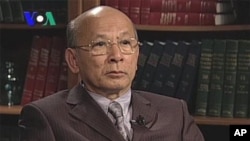WASHINGTON DC - Cambodia’s court system is only partly functional and has caused 20 years of injustice, a leading analyst says.
The judiciary is facing more and more pressure, as land disputes and other cases pit impoverished Cambodians against powerful businesses or politicians.
But the court is not viewed as independent, which violates a fundamental right, that of a fair trial, Lao Monghay, an independent analyst, told “Hell VOA” Thursday.
“That is the right to being tried by an independent court and impartial court created by law,” he said. “So Cambodia, since having a new constitution in 1993, has defied this right. To violate this right mean to create injustice for the accused or those who are in a court case.”
The government must improve the judiciary or face the prospect of increased unrest and destabilization, he said. “This Cambodian nation has dissolved often, and in my view the factor of injustice is a factor that help weaken our country, even if it does not dissolve.”
In a family, the parents must be fair to everyone, or there will be fights, he said. It is the same in a society.
With courts under political pressure, they can be used as a political tool to silence government critics, protesters or opponents, he said. Less and less people now trust the courts, he said.
“This is a serious problem for a country and a society, when the top national institutes cannot have support and confidence,” he said. “There must be action to gain confidence. If people cannot find justice, they rely on spirituality and make prayers somewhere, or ask powerful leaders like Prime Minister Hun Sen, instead of the court. This is not a solution, because Samdech Hun Sen alone cannot solve the problems [of everyone]. That’s why we have the division of power.”
Lao Monghay was referring in part to the arrests of housing activists in recent days from the Boeung Kak and Borei Keila neighborhoods of Phnom Penh. On Friday, demonstrators carried pictures of the two activists, Tim Sak Mony and Yorm Bopha, to the office of Cabinet Minister Sok An, where they delivered a plea for his intervention in the cases.
Lao Monghay suggested strengthening the courts with stronger mandates for judges, better budgets for the courts and punishment for those found guilty of corruption. Oversight of the courts is up to the National Assembly, which should pass laws immediately, and the king, who should sign them, he said.
Abuse of the courts by Adolf Hitler, in Germany, and Josef Stalin, in Russia, were signs of despotic regimes that repressed their populations, Lao Monghay said.
Government spokesman Phay Siphan said the government is trying to reform the judicial system, but he discouraged criticism of the system. He denied accusations that the courts work in the interests of the ruling Cambodian People’s Party. “The law is the law,” he said, and those who commit wrongdoings will be punished by law.










